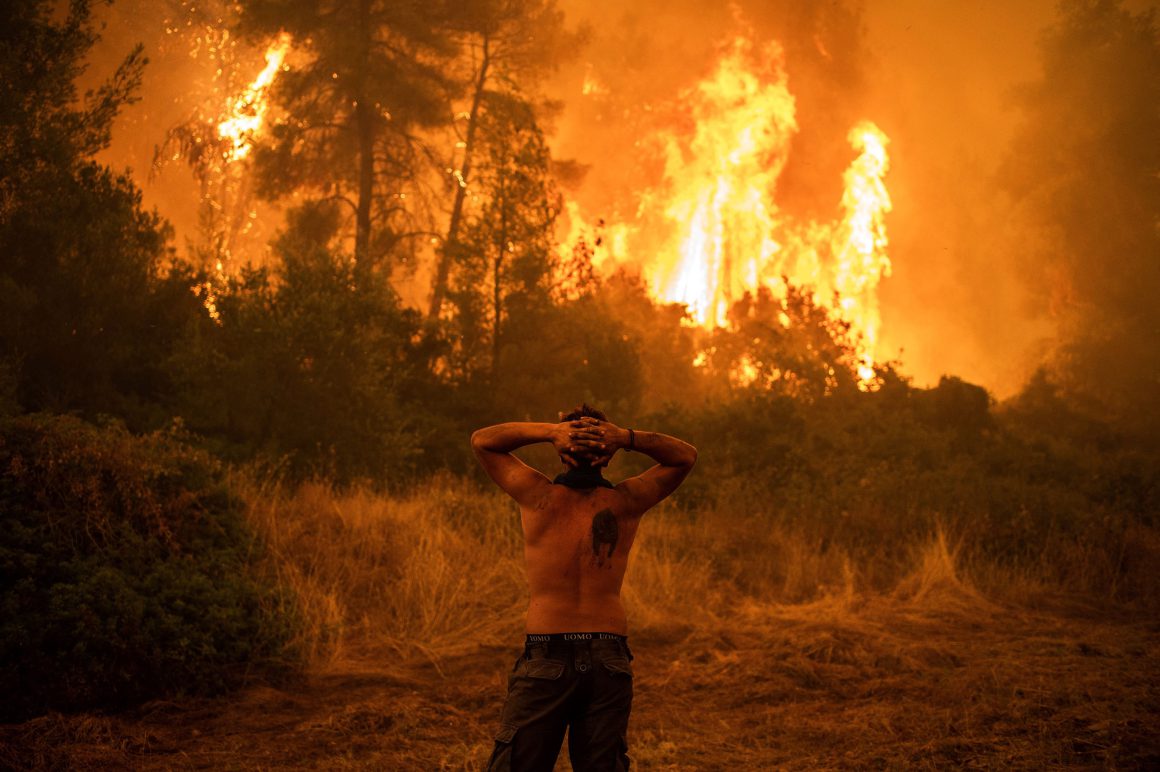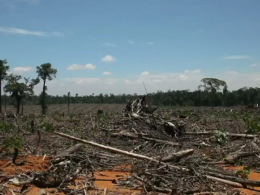By Ben Samson
Levels of CO2 in the atmosphere are now 50% higher than at the onset of capitalist industry in the 1800s. Without urgent action, it will be 100% higher by 2060. At this point, the latest IPCC report predicts that the earth’s surface temperature will have increased by between 2.4°C and 4°C. By 2040, it will be at least 1.5°C warmer. The consequences of this will be devastating.
Even below the 2°C upper limit set by the 2015 Paris Climate Accords, recent climate simulations published in the journal Earth System Dynamics have predicted at least a 30% chance of disastrous climate tipping points being crossed. When this happens, the earth becomes “self-transforming” as critical natural systems begin to collapse as part of a catastrophic domino effect.
No confidence in capitalist politicians
For such a future to be averted, emissions need to be halved by 2030 and made neutral by 2050. Exactly how this will be achieved will be the subject of discussion when some 20,000 ‘world leaders’ and climate activists meet at the UN COP26 climate summit in Glasgow this November. However, reasons abound why we can hardly be expected to hold our breath:
- Since the Paris Climate Accord, the world’s 60 biggest banks have provided fossil fuel companies with over $3.8 trillion in finance.
- Between January 2020 and March 2021, the G7 countries committed $42 billion more in spending on fossil fuels than on clean forms of energy.
- According to the International Energy Agency, the use of coal – the worst of all fossil fuels – has increased since the start of the Covid-19 pandemic.
- As stated in the UN’s 2021 Production Gap report, governments are “dangerously out of sync” with the emissions cuts needed to stay below 1.5°C warming. They currently plan to produce 240% more coal, 57% more oil and 71% more natural gas by 2030 than what would be allowed by the 1.5°C target.
Perhaps reflecting on this, Alok Sharma, the Tory cabinet minister responsible for hosting COP26, has admitted that the key task of COP26 – agreeing plans for global net zero emissions by 2050 – will be even harder than achieving the totally inadequate measures which were agreed on at the Paris Climate Accords.
The extent to which capitalist politicians are taking the emergency seriously was captured in leaked documents reported on by the BBC. From these, it emerged that Saudi Arabia, Japan and Australia are all pressuring the UN into downplaying the need to move away from fossil fuels. For example, an adviser to the Saudi Oil Ministry demanded that “phrases like ‘the need for urgent and accelerated mitigation actions at all scales…’ should be eliminated from the report”.
Capitalist powers offer no solution
The countries which plan to increase fossil fuel production the most are China and India – two power-house industrial countries. China, which is often cited as the reason why efforts towards climate action elsewhere are futile, relies on coal for over half of its power and accounts for 60% of this year’s rise in coal usage.
However, the huge electricity demand in China is not just because of its huge population (its use per person is comparatively low), but it is also because its capitalist economy is the world’s biggest exporter. In 2020, despite the Covid-19 pandemic, it recorded a record high of almost $2.6 trillion in exported goods, with the US and European Union being its biggest trading partners.
China can also be cited as an example of how attempting to tame capitalist industry to stave off climate breakdown is beyond hopeless. Recent attempts by the Chinese State to reduce coal production in order to reduce emissions are now resulting in massive power outages because its privatised coal companies are unwilling to operate at a loss.
According to Goldman Sachs, which has just been granted permission by the Chinese state to purchase full ownership of its Chinese partner company, the outages have affected 44% of the country’s industrial activity. Fearing how this might threaten the profits of its big investors, China has now reacted by ordering more than 70 Inner Mongolian coal mines to ramp up coal production by almost 100 million tonnes.
Writing is on the wall – socialism or climate catastrophe
“The character of economic development produced by the nature of capitalist society is viewed by many political economic critics as ultimately unsustainable” – this statement was removed from the final draft of this year’s IPCC report.
However, that it even made it that far is hardly surprising given the findings of a recent UN-sponsored report, which found that not one of the world’s main industries would be profitable if they had to pay the costs of their environmental damage. What this tells us is that evidence and processes of climate change are not enough in and of themselves to prevent it from happening. Rather, as revealed in the most honest of scientific analyses, it is the capitalist system which specifically needs to be done away with.
Capitalist governments, at this stage, are not ignorant of the severity of the climate crisis. Although they are often either incompetent or corrupt, the fundamental truth is that they have their hands firmly bound by the capitalist system they represent. Instead, they will settle for using their power and wealth to avoid the worst outcomes of climate change for as long as they can, hiding behind a growing pile of poor and working-class casualties in the meantime.
What is required is action from below, by the global working class, organising for a system of our own. Such a system would necessarily be a socialist one – where the wealth resources are publicly owned, democratically controlled and used rationally to build a society which not only works within the ecological limits of our world, but also serves to end exploitation, misery, and oppression in all its forms.
For a socialist climate action plan:
- Stop all chemical pollution and toxic mining. Ban the import of fracked gas and scrap plans for LNG terminals. End all state subsidies and investments in fossil fuels.
- Unprecedented public investment in renewable energy, based primarily on wind and solar power. Establish a new public energy company to build the necessary infrastructure. Bring the major energy companies into public ownership.
- Free, reliable, massively expanded public transport.
- For a just transition that protects the livelihoods of workers and small farmers. End the dominance of dairy and beef and move to sustainable forms of agriculture, afforestation and rewinding. No job losses, introduce a 4-day / 32 hour working week for all workers without loss of pay.
- A state-run construction company to retrofit all homes and buildings for energy efficiency.
- Key polluting industries to be taken into democratic public ownership, and phased out or converted to socially-useful production.
- Break with the failed capitalist system. For a democratic socialist planned economy to provide for people’s needs and protect our climate and biosphere.












